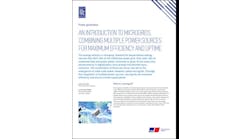An English muffin with a side of sustainability: National bakery goes microgrid
Environmental, social and corporate governance (ESG) investments are reaching record levels and driving up demand for clean energy as businesses strive to achieve sustainability goals. Where microgrids will fit into this trend remains an open question. But a major US bakery company is offering a model.
Bimbo Bakeries USA, the maker of such products as Thomas’ English muffins, Arnold bread, and Sara Lee and Entenmann’s pastries, plans to install microgrids at six manufacturing facilities over the next year with the help of GreenStruxure, a subsidiary of Schneider Electric.
The bakeries are in California, a power outage-prone state where microgrids are being built at a rapid clip to keep the electricity flowing. But the motivation of Bimbo Bakeries is different. The subsidiary of Mexico-based multinational Grupo Bimbo sees microgrids as a carbon reduction play.
“Grupo Bimbo and Bimbo Bakeries USA are committed to net zero carbon by 2050,” said Chris Wolfe, Bimbo Bakeries USA’s senior director of environmental sustainability. “These on-site microgrids represent a key component to our diversified strategy.”
The solar plus storage microgrids will serve bakeries in Montebello, Placentia, Oxnard, San Luis Obispo, South San Francisco and Sacramento. Bimbo has more than 60 manufacturing facilities in the US but chose these six sites because of their energy intensity and the decarbonization opportunity they offer. Also playing into the decision was the high cost of utility power in California.
“In California, the combination of rising utility rates and an incentive rich atmosphere for renewable energy allows these projects to be not only profitable but also improve the communities where we live and work,” said Kevin Yavari, Bimbo Bakeries USA’s senior regional manager of environmental sustainability for the western US.
Microgrids in sustainability plans
The microgrids will deliver about a 25% carbon reduction and 25% of the electricity needs for the sites. The solar capacity for each bakery will range from one-half to two megawatts, according to Clark Wiedetz, chief sales officer at GreenStruxure, which will design, build, own, operate and maintain the microgrids.
Use of microgrids, a form of on-site energy, to meet sustainability goals stands in contrast to another emerging strategy — signing virtual power purchase agreements and capturing renewable energy credits from solar or wind power built off-site, sometimes in another state. That approach represents “a financial play,” said Wiedetz.
“Nothing wrong with that. But when you’ve got it there, at your site, it’s more than a financial play. It’s a philosophical play,” he said. On-site energy offers a tangible way to demonstrate sustainability — a physical representation of the company’s values.
“The employees get to see it. My customers get to see it. It’s much more powerful when you’re putting in your report, ‘Look what’s happening at our locations,’” Wiedetz said.
Learn more about the Bimbo Bakeries microgrids during a special presentation at Microgrid 2022: Microgrids as Climate Heroes in Philadelphia, Pennsylvania, June 1-2
Wiedetz also pointed to economic advantages. When microgrids are built under energy-as-a-service contracts, as the Bimbo Bakeries microgrids are, they require little or no upfront investment from the business. That frees cash for the business to pursue its remaining sustainability or energy goals.
“I’ve got 25% now. And for that 25%, I’m not putting down any capital. So I could now look at that other 75% and say, well, if I need to spend money, I only have to spend money on the 75%,” Wiedetz said.
In addition, the microgrids’ payments are set at a predictable rate over the term of the contract, offering a potential hedge against what’s expected to be rising energy rates.
All of the stakeholders involved — from bakery facility managers to operation and maintenance teams — will have insight into the energy activity at each of the facilities via a digital platform. The platforms provide a range of information, such as energy production, maintenance work and carbon reduction at each individual site or all sites cumulatively.
GreenStruxture incorporates intelligent software and controllers to improve energy management at the sites, allowing for peak demand management and use of either grid power or on-site energy based on the goals set by the facility.
Modular microgrid construction
While resilience isn’t a primary intent of the microgrids, they will be built in a modular fashion to be “resilient-ready,” Wiedetz said. That means generation and storage assets can be added in the future as the facility expands or as sustainability plans change. This addresses a risk sometimes raised by corporations as they undertake long-term ESG planning. Given that they can’t know what technology will be available in the future, how can they design an energy system today for a plan extending to 2050?
For Bimbo Bakeries, the six microgrids may only be the beginning. GreenStruxure is working with the company on additional yet-to-be-announced projects.
Wiedetz sees ESG planning driving microgrid development at other businesses as well.
“Sustainability is huge,” he said, with ESG planning being pursued by “a larger and larger percentage of organizations across many market segments.”
Grupo Bimbo, alone, offers an attractive potential market for microgrids. The company describes itself as the world’s largest baking company with operations in 33 countries.
“Bimbo Bakeries USA’s actions have made it very clear that they are going to lead the market when it comes to sustainability,” said GreenStruxure CEO Jose Lorenzo. “On-site energy systems are Bimbo Bakeries USA’s best option to decarbonize and fulfill their long-term sustainability targets with optimized cost. We launched GreenStruxure to work with companies like Bimbo Bakeries USA to bring our no hassle, modular, standardized approach to these facilities and more in the US.”
Track news about the use of microgrids in achieving sustainability goals. Subscribe to the free Microgrid Knowledge Newsletter.







